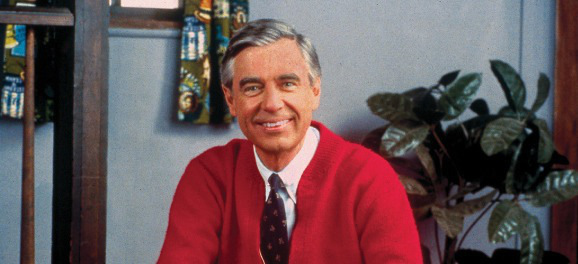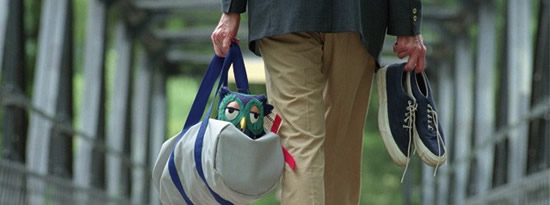Redefining Cool: The Legacy of Mister Rogers
It's not cool to like Mister Rogers.
He's boring. He's weak. He's creepy.
Right?

Mister Rogers taught a lot of things to a lot of kids over a lot of years -- myself certainly included. But what strikes me as most significant is the fact that his lessons are not just for kids. His message is just as important and applicable to the lives of adults as it is to those of children. Reflecting on the message of Mister Rogers -- a man deemed so "uncool" by our ultra-hip society -- it becomes quite clear to me that our world could stand to be a little less cool.
Mister Rogers was positive.
As recently as this past Valentine's Day, author Tim Madigan reflected on the positive spin that Fred Rogers put on what Mr. Madigan had labeled a Hallmark holiday: "We should always be grateful for any opportunity to express our love for another."
Even in times of ultimate tragedy such as the events of September 11, 2001 and the December 2012 shooting at Sandy Hook Elementary School, Mister Rogers' positive message shines brightly on a dark situation as he encourages people to "look for the helpers."
But being positive isn't cool.
Mister Rogers was not afraid of a challenge.
There are many instances among the hundreds of episodes of Mister Rogers' Neighborhood when Fred clearly stepped outside his comfort zone -- one of the most popular in the cyberworld being when he once tried his hand at breakdancing.
Additionally, Fred was never afraid to tackle the tough topics avoided by others in the media -- feelings, assassination, war, divorce. Nothing was off limits. As he is often quoted as having said, "Anything mentionable is manageable."
But facing challenges head on isn't cool.
Mister Rogers was patient.
As is mentioned in multiple articles, books, and interviews, Fred Rogers found great value in patience and silence. One of his well-known songs emphasizes the importance of taking your time: "I like to take my time. I mean that when I want to do a thing. I like to take my time and do it right."
But it's not cool to be patient.
Mister Rogers paid attention to you.
Many people who spoke with Fred Rogers over the years had similar experiences in that they felt nothing else mattered to Fred more in that moment than the person he was talking with. Oftentimes, the interviewers became the interviewed as Fred would show great interest in the stories of others.
Furthermore, daily visits to the Neighborhood were designed with one child in mind. Not one specific child necessarily, but Fred would speak into the camera as though he was addressing one individual viewer rather than the countless children who were watching around the world.
But it's not cool to give others your full attention.
Mister Rogers was generous.
If you listened to the podcast interview with Bert Lloyd, you may remember the story of Mr. Lloyd visiting the home of Fred Rogers. When Mr. Lloyd complimented a framed image on the wall in the Rogers' home, he found himself going home that night with the image itself -- removed from the wall, gift wrapped, and given to him by Mister Rogers.
But being generous isn't cool.
Mister Rogers never backed down from his message.
In 1969, when major cuts to the funding of public broadcast were pending, Fred Rogers appeared before the United States Senate and delivered a passionate and purely authentic testimony about the need for quality programming.
In large part due to what has since become famous footage of Fred, PBS funding was increased from $9 million to $22 million.
But it's not cool to stand up for what you believe in.
Mister Rogers was appreciative.
Receiving the Lifetime Achievement Award at the 1997 Emmy Awards, Fred Rogers took the stage and turned this moment in the spotlight around, focusing it on those who helped him and encouraged him throughout the years.
He even asked those in the audience and watching at home to do the same for themselves:
So many people have helped me to come to this night. Some of you are here, some are far away, some are even in heaven. All of us have special ones who have loved us into being. Would you just take, along with me, tens seconds to think of the people who have helped you become who you are? Those who have cared about you and wanted what was best for you in life. Ten seconds of silence. I'll watch the time.
It's not cool to appreciate others though. Not cool at all.
Mister Rogers was inspirational.
Fred Rogers was so much more than a television host. He was a teacher, a mentor, and an advocate for children -- for all humanity, really. His message has inspired films, books, songs, and even websites such as this one. More importantly, Fred was -- and continues to be -- an inspiration to those who take to heart his message of peace, acceptance, love, patience, and kindness.
But that message isn't cool.
Is it?
Fred Rogers will be remembered in many ways today -- the tenth anniversary of his passing. Reflecting on the impact of his life, I think it becomes quite clear that our societal definition of "cool" is far from accurate. Maybe it's time to reevaluate our priorities -- as a society, as communities, and as individuals.

[Image courtesy of The Fred Rogers Center]
The legacy of Mister Rogers is not forgotten.
As so perfectly stated by Eliot Daley, former Executive Vice President of Family Communications, "Fred Rogers may be elsewhere these days, but does he ever live among us!"
Does he ever.
27-Feb-2014
[This article was originally published on the Neighbohrood Archive blog in February 2013.]
